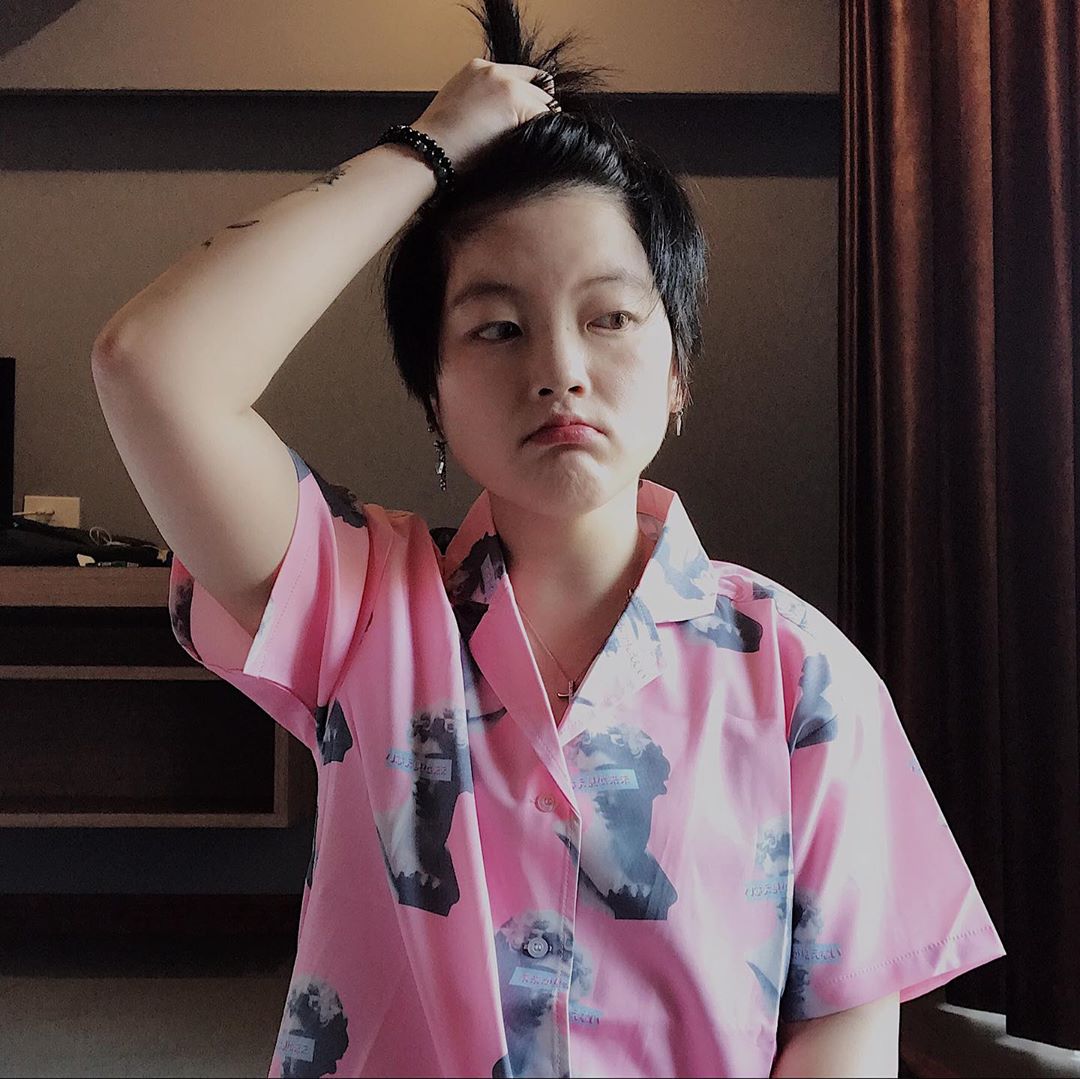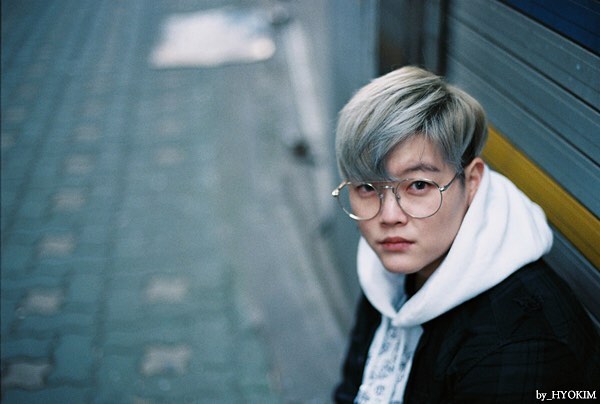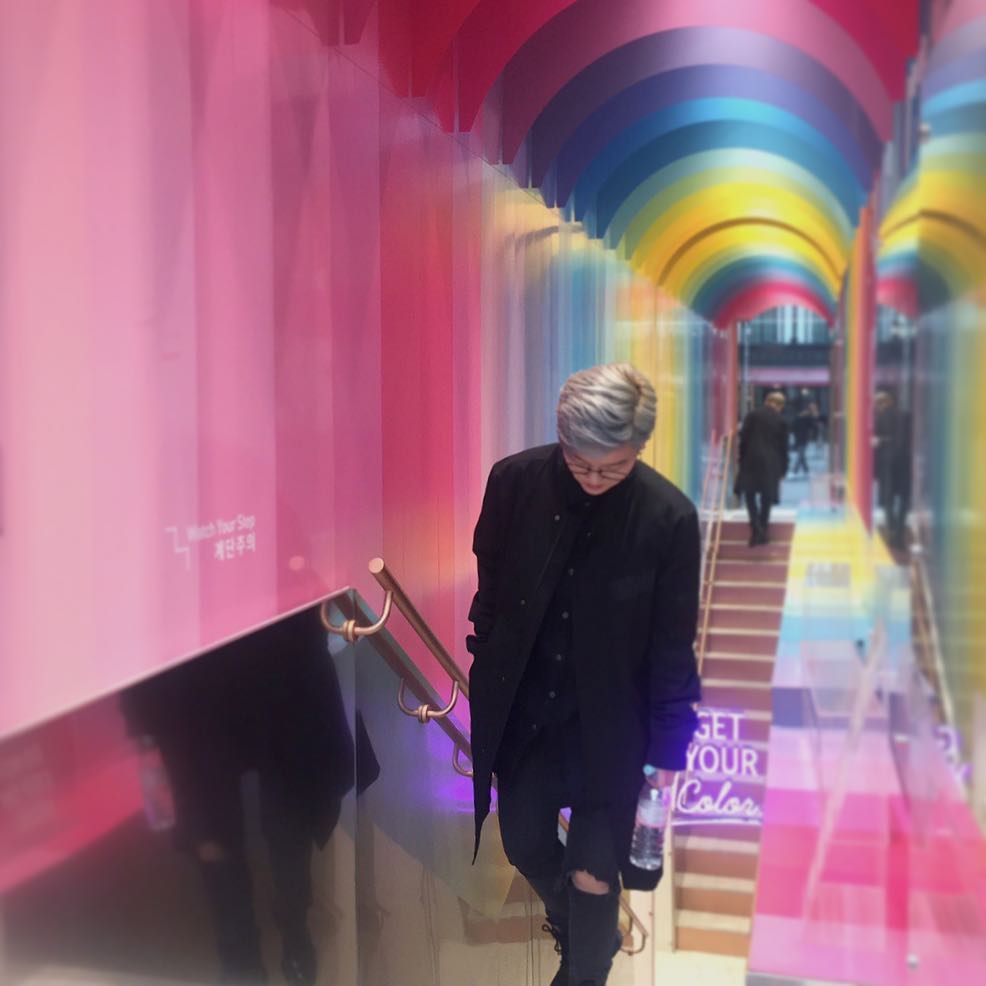Used in the 19th and 20th centuries as a pejorative term, oftenly assigned to men who didn’t fit in the society’s idea of masculinity, the word “queer” has been appropriated by the LGBT community to include the growing acknowledged diversity within the community. In the same attempt of a wider inclusion, new acronyms have emerged in the past few years – LGBTQ+ and LGBTQIA+, for example -. And for the second part of the LGBTQ+ Korea series, we present you part of the queer experience in South Korea through Hayden Royalty’s perspective – a genderqueer youtuber who has been using the platform as a space to bringing awareness about the many existing identities.
Read the first part of LGBTQ+ Korea series featuring emoxsemo couple
To the ones who are not familiar with, the word “queer” works as an umbrella term, including a series of other labels, gender identities and sexual orientations that aren’t a part of the wide acknowledged terms – such as gay, lesbian, bisexual and transexual -. Hayden identify as gender queer, a term used to include all gender identities that doesn’t exclusevely fit to female or male genders. They talked to K4US, sharing a bit about their experiences of a Korean-American gender queer person living in Korea. Check it out below!

My name is Hayden Royalty. I’m a genderqueer Korean-American who currently resides in Seoul. I am an activist, community organizer, and a queer content creator. I currently have a YouTube channel where I share about my experiences as a Queer Asian American living in Seoul and make sex education content as well. Currently, I’ve been focusing more on interpersonal work like community organizing and have co-planned and co-hosted my first queer retreat in May. We rented Airbnb space, had group meals, and facilitated workshops for the attendees. I organize events where we all gather and enjoy a meal and movie together and am hoping to host more of those kind of events. I am 29 years old and I moved to Korea for several different reasons. I moved to Korea for job opportunities because it was quite difficult finding a job after graduation. I also moved to Korea to get out of a toxic environment that was affecting my mental health and hurting my relationship with my parents after I came out to them. I also moved to Korea to start a new chapter in my life. Finally, I also moved to Korea to learn more about my Korean culture and modern Korean society
Well, first of all we want to to make sure we use the right pronouns with you. It’s they/them, right? In Brazilian portuguese we don’t have such agender pronouns which makes us go around to better include queer people. How is that process in the Hangul? Do you have the right pronouns to refer to you? Considering the honorifics (unnie/oppa/noona/hyung) are based on the binary gender structure, how does a non-binary person deals with it in the daily life?
Yes, my pronouns are they/them/their. In Hangul, people do not usually use gendered pronouns. Yes, people use unnie/oppa/noona/hyung. I can’t speak for non-binary Korean natives, but for myself as an American, people usually automatically call me by my name or if I ask them to refer to me with my name only and no honorifics, people are very understanding and respectful of that. I asked people to just call me by my name and not to use honorifics because on top of gendered honorifics, I prefer not to put emphasis on age hierarchy.
We saw that you don’t identify yourself as either of the genders. How was the process to understand that? How old were you when you realized that and when you came out?
In university, I met other genderqueer people and many of them shared their journey and what genderqueer meant to them. During this process, I felt that they were talking about me because everything I’ve felt, they were able to put it in words. This was the first time I felt that my experiences were valid and that I wasn’t alone. I realized I was genderqueer when I was about 20 years old and started socially transitioning.
You said you’ve been community organizing. How did you decided to go on this way and how was the experience of this retreat you hosted? Can you share with us how many people attended, what was your goal with this kind of event and its outcome?
A friend and I planned for two months trying to figure out accommodations, food, activities, and workshops. We didn’t want the cost to be high so we budgeted well and hoped that people were willing to be understanding of our limited resources. It was a success and people’s feedback were great. They enjoyed that housing was separated by those who wanted to stay up late and enjoy each other’s company in a loud setting and for those who wanted to get some sleep and use library voices. They also enjoyed that we were accommodating of everyone’s different diet (vegetarian, pescetarian, etc). Many enjoyed the workshop that I facilitated. It was “How to be better allies to trans* and nonbinary people”. 25 people signed up for this retreat. Our goal was to have a retreat that was fun and educational and connected the community through food, recreational activities, workshops, and discussions and of course with some dancing and music. We were both inspired by the similar spaces that we wanted to attend ourselves but couldn’t because they were held abroad. We felt that we were probably not the only ones, so we gave it a try.
You also mentioned that you’ve been producing sex education content. How has the response for that been? Do you believe that the lgbtqia+ community isn’t much informed about this kind of subject?
Actually, I should be more clear. I review sex toys and talk about sexuality and safe sex all at the same time. For example, I made a video with a friend about making DIY dental dams that explained how to use dental dams and why people use them for. I’ve also done sex toy reviews and talked about the different kinds of things that may or may not give pleasure to people. There were some good feedback through Youtube comments, but many more feedback were given in person to the owners of Piooda, a sex toy shop that allows me to review the toys. They personally told me that many customers come in the store and mention my videos and how that made them curious about testing the toys that I reviewed. It is difficult to have these kind of contents because of the restrictions of Youtube, but even knowing that, I enjoy making these videos.
Learning about your culture was one of the reasons you moved to Korea. But considering what you told us, you also have been working on changing prejudice oriented behavior inside this culture. How do you feel about that?
I never actually thought of it like that. I think sometimes of how I’m treated by native Koreans, I strongly see myself as an outsider of the culture and society. As an outsider, I felt that I shouldn’t try or force to change a society and say that my culture is right and others are wrong. But when it comes to queer rights, we are talking about human rights. And when you’re pushing to change for people’s human rights, there is no wrong in it. But you are right, even as an outsider, I can make impact on changing views and ideas of queer people among cishet native Koreans. I just feel like I’m living a more honest and interpersonal life by letting myself be who I am and holding authentic relationship with people where hiding my sexuality isn’t like hiding a dark secret anymore.
It’s been almost three years since you officially came out as gender queer on your Channel. How have things changed since then? Do you think you understand your own self better?
Ever since coming out publicly on my channel, I felt more confident and less apologetic for who I am. I speak up for myself more and correct people about my pronouns without feeling bad about it. I feel that I’m also more responsible to speak up about pronouns and transphobic language/non-inclusive language for those who aren’t out and open since I am more of a public figure in the community. It’s allowed me to be more motivated and passionate about organizing spaces to learn and teach more about trans* and nonbinary people and inclusive language. I do think I am getting to understand myself better.
Non-binary/gender queer is still a very underrated issues and manter people doesn’t evento know that’s possible. Is it difficult to expose your gender identity to people you just met? Do you get more curious or negative reactions? And Do you know a lot of Koreans who identify as gender queer?
It is more difficult to come out as genderqueer than it is about my sexual orientation, though I find it easier to come out to other members of the queer community because the chances of them knowing what genderqueer/nonbinary is is higher. I usually do not get aggressively negative reactions where someone denies my gender identity, but dismissing my identity is common and so in that way, I find it quite negative. When I first came to Korea, I didn’t know any, but now there are more and more Koreans I meet that identify as genderqueer.

Yes and no. When I first came to Korea, I didn’t tell anyone that I identified as genderqueer. I didn’t tell anyone about my pronouns. I just let everyone assume I was a cisgender lesbian because no one knew what genderqueer was 6 years ago. The community here is quite conservative.
It doesn’t make much sense to us that Korean lgbtqia+ community is filled with conservatism, considering that lgbtqia+ culture means progress and denying queer people of being a part of the community perpetuates the harm that we’ve all been facing for years in a heterosexual society. What are your thoughts about this matter?
It doesn’t make sense to me either, but it exists. There’s other ways to be conservative that influences the queer community. For example, LGBTIA+ people’s ideas of gender can be very conservative that people expect men and women to act a certain way disregarding their sexual orientation. Therefore, there is a lot of femme-shaming towards men and there’s a lot of negativity towards butch women. Religion can also be a source where conservative ideas come from. There are ideas that ‘sure, you can be born gay, but God doesn’t make mistakes and your body is the one that God gave you. This idea denies trans bodies and trans people, who feel like they were born in the wrong body. For the people who think like this, I believe that the change has to come from themselves. Just as they once denied their own sexuality, there came a time where with enough education and exposure, they were able to accept themselves for who they are. The same will need to happen for how they accept other people.
You talked about femme-shaming towards men and prejudice against butch women. Can you explain a bit about that to us?
I believe there’s still either internalized homophobia and/or the fear of being outed is very strong that any behavior that may out people is strongly avoided or undesired. For example, butch women are seen to be ‘too gay/lesbian’ that ‘femme’ and/or ‘straight passing’ women avoid or do not look in a partner bc they believe through association they themselves will be outed by these butch women. Femme men also get this kind of prejudice, just the other way around. And I am not referring to preference bc that is a whole different topic.
In your Chanel you’re constantly talking about lgbtqia+ issues. Was that a goal when you first thought about venturing on YouTube? What inspires you to make this kind of content?
My goal was to show people out there that people like me existed. That not only LGBTQIA+ people existed, but Asian and queer people exist. I wanted to show people that queer Koreans do exist as well. I wanted to show the world that our voices and our stories matter just as much as other people in the LGBTQIA+ community and as other people in the Asian-American community. The lack of visibility and representation inspires me all the time to make these kinds of contents.
Considering your kind of content, you may help a lot of people who might be going through difficult situations. How do you feel about allowing those people to feel comforted and safe through your videos? Did you have something like this during your process of self discovering?
It’s an honor to make a space, even if it’s virtual, where people can feel validated and safe from my content. And I want to continue to make this space bigger and more influential. I did not have these kinds of spaces growing up. There was a lack of visibility and representation of people like me that I struggled to feel normal about myself for a very long time. I experience internalized homophobia and self-hatred growing up in a conservative Catholic Korean background in Orange County, California.
Thanks to Korean pop culture, the country is getting more popular everyday. But this pop culture scenery includes little to no lgbtqia+ representation; there are two out singers with little visibility inside Korea and the popular dramas hardly take on issues regarding the community. How do you think this lack of representations influences on the development/growing up process of korean lgbtqia+ youth?
I believe the lack of LGBTQIA+ representation influences a slower progression of social acceptance of the country as a whole. Although there isn’t visibility and representation on big media networks and the big screen, platforms like YouTube do have LGBTQIA+ figures that I believe Korean LGBTQIA+ youth can find if they wanted to.
Korea is known for its conservatism. Do you believe that just as it’s happening over the world, the younger generations are opening up more to understand diversity and social minority related issues?
Yes, I do believe that there is progression in acceptance of diversity and more awareness of social minority related issues. There’s more information out there and there’s more push for equality.
Brazil has one of the world’s highest lgbtqia+ murder rate which brings a sense of constant fear for the community. How is the scenery in Korea?
I think in Korea, there isn’t much hate crimes on LGBTQIA+ people specifically because LGBTQIA+ identities are still not commonly known or visible for people to specifically target an individual for their sexual orientation or gender identity.
We heard lgbtqia+ community in Korea is very closed. How does it work and what is your favorite thing about the community?
A big part of the community is not out. It means that many are not out to friends and family and have no plans to. It also means that many spaces and events are from word of mouth, even though there are more and more spaces and events that are more visible on social media. Clubs and bars for queer AFAB (assigned female at birth) people cannot be found on maps. You need someone who has been there to show you or tell you where they are. My favorite thing about the community here (specifically the expat/foreigner queer community) is that we have a close bond and support each other.
What makes you hopeful about a future with better acceptance and less prejudice in Korea?
I believe with the rise of more visibility of queer people taking space that Korea will be more accepting in the future.
I know currently the Amazon is burning and there’s a lot of political tension in the country, I hope that Brazilians subscribers are safe and stay strong during these times. And for the rest of the world, I hope if they can, to please help save the reserves. And to the LGBTQIA+ community worldwide, I hope my story and experience can help anyone who is in need of help whether it’s inspiration, motivation, or advice in their own queer journey and existence.
– Hayden Royalty
We appreciate Hayden’s availability for the interview and for all the
effort they have dedicated to the LGBTQIA + community.
Interview by Bea and translation by Lýssa | K4US Writing Team
www.k4us.com.br | Do not remove without credits.
 Português
Português English
English 한국어
한국어